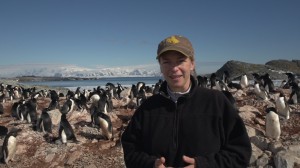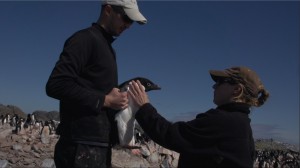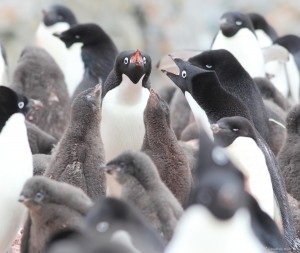A completely different part of the world, white snowy hills and mountains, thousands of penguins and seals, surrounded by miles and miles of sea ice, the Western Antarctic Peninsula is not what we assume it to be. It is a place that has changed drastically every decade due to the warming of the planet. This has altered the lifestyles of the inhabitants of the islands, especially the penguins. When “Beyond The Ice” was launched, I knew that I wanted to learn about the penguins out there. My honest thought was…are they similar to the ones in Happy Feet 1 and 2? Like happy and healthy Antarctic penguins on white snow that could flap their wings and dance (maybe I’m exaggerated a little bit)!
Watching Donna Fraser’s interview and the work she does, I learned about the three types of penguins that are being studied in Palmer Station: the Adelies, the Gentoos, and the Chinstraps. I have the opportunity to put together a short film about Donna and her research with the Adelie penguins of Humble Island. As Donna talked about how their population has reduced by 80-85% in the last ten years, I couldn’t help but feel for these penguins living in an environment with little snow. There are green patches where there never used to be and multiple snowfalls and precipitation, something Adelies are not used to. There are also less silverfish than before, and silverfish used to be common in their main diet. Adelies now mainly eat krill, and silverfish has almost disappeared in their diets. Donna and her team of researchers help place radio tags on penguins so that their flight and forage trip duration is measured. This includes a lot of interaction with the penguins, like measuring their beak sizes, weight, diets, diving depths and applying this information with the rest of the data of the long term ecological project to see what is going on in the ecosystem and how the penguins are being affected.
Donna Fraser’s research is very new to me and there’s a lot of science involved, but her work is very inspiring because these scientists have been researching for years. As Donna says, “it’s invaluable to have the long term view of how penguins fit into the system and what we can learn about the system through the penguin’s eyes.” “Beyond The Ice” has given me opportunity to apply what we have learned in our documentary filmmaking classes and use it to craft together a story. I’m very grateful that we are allowed to be creative and hope to discover a great deal about the aspects of editing and filmmaking. It’s very exciting to work with real stories in the Rutgers Film Bureau this semester!






 Follow the
Follow the  Subscribe to the blog RSS feed
Subscribe to the blog RSS feed